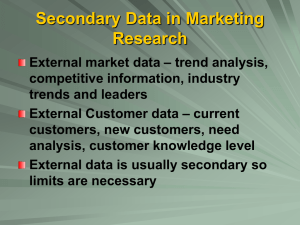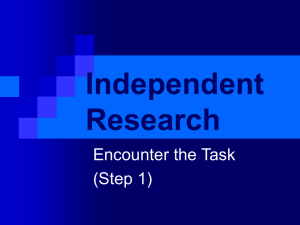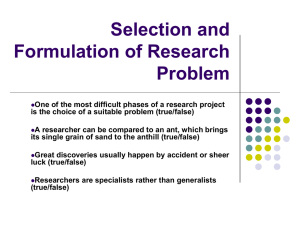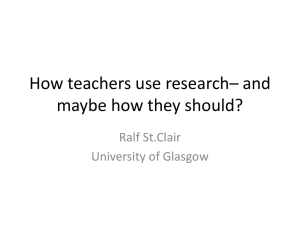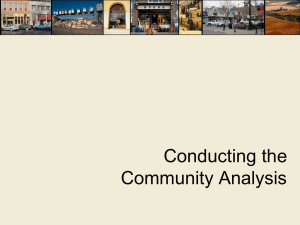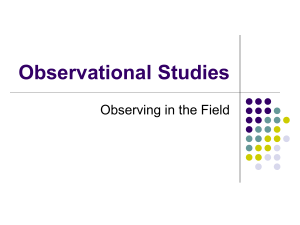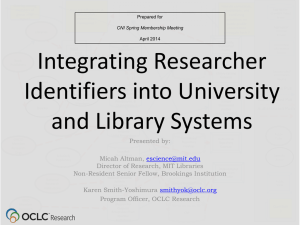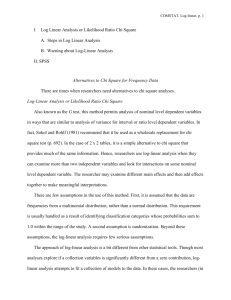Collaborating with young people through a research advisory group
advertisement
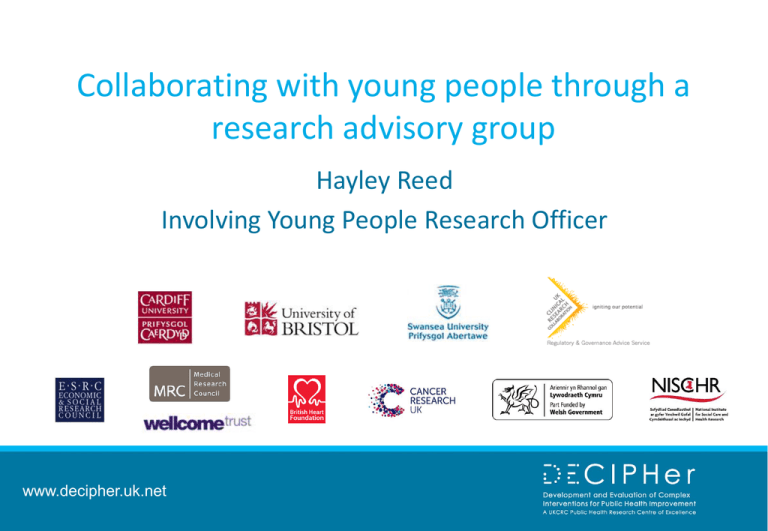
Collaborating with young people through a research advisory group Hayley Reed Involving Young People Research Officer www.decipher.uk.net Introduction DECIPHer (the Centre for the Development and Evaluation of Complex Interventions for Public Health Improvement) is a UKCRC Public Health Research Centre of Excellence and a collaboration between Bristol, Cardiff and Swansea Universities. PHIRN (Public Health Improvement Research Network) is a registered research group that aims to increase the quantity and quality of public health improvement research that is relevant to policy and practice. ‘Transdisciplinary Action Research (Stokols, 2006) is an approach where multiple academic disciplines work with policy makers, practitioners and the public to coproduce evidence through a cyclical partnership • Researchers - Scientific Knowledge • Policy Makers – Policy/Government knowledge and knowledge translation • Community (Young People) – Knowledge in context about young people’s lives. www.decipher.uk.net Infrastructure funding for collaboration with the public: • Young people’s research advisory group (ALPHA – Advice Leading to Public Health Advancement) • Involving Young People Research Officer ALPHA do not work on one single project instead they work at bid development and then decide which ‘pockets’ of the research project they work on’ – (Pockets of Participation, Franks 2011). Since April 2012 the group have been involved in: • Nine research projects (four on more than one occasion) • One international conference to represent Welsh young people on the HBSC (Health Behaviours in School-Aged Children’s survey), with Welsh Government funding. • Planning and running another conference with the AYPH (Association of Young People’s Health) www.decipher.uk.net www.decipher.uk.net Microsystem level: Researchers needs Microsystem level: Young Peoples needs Mesosystem level: research centre needs Macrosystem level: research environment Framing the public collaboration, using Bronfenbrennaur’s (1992) ecological systems theory to understand the influences and needs at many levels Microsystem level: Researchers needs Attitude Microsystem level: and perception of young people Young Peoples needs Increased time for research Time Money for indirect costs Support from worker Training Flexibility and respect Guidance Costs – Expenses etc. Case Studies and opportunities to share public Group cohesion and peer support involvement practice Training – Research knowledge and group skills Support from researcher that works with the Feedback young people Mesosystem level: research centre needs Architecture of involvement including a dedicated facilitator Collaborative readiness Clear objectives and intended outcomes Realistic expectations Time to build a common ground Communication Centre policies and principles for public involvement Centre ethos Macrosystem level research environment: Research Policies and guidance Research funders – Infrastructure funding for young people’s advisory group Currently and in future Dimensions data to be collected on From whom How Researchers PI Knowledge 1. General PI needs Researchers Understandings of PI; Barriers and Facilitators of PI; Researcher PI Experience; PI support and training needs Researchers PI seminars and questionnaires May 2012. On-going noted by IYPRO and Principal Investigator Young People’s Knowledge 1. General PI needs Training and support; groups established so no barriers to involvement ALPHA Training on public health and research. On-going training noted as needed. 2. Research project information Type of activity; Stage of activity; What researcher/s and which institution/s; ; The research e.g. public health area Researcher 3. Planned Scope of PI The Purpose of PI; Stage of research to undertake PI; Degree of PI Researcher Form 1a (Request questionnaire) 4. PI costings What activity is funded e.g. using costs put together Researcher Form 1a (Request questionnaire) ALPHA During the public involvement process ALPHA Questionnaire or exercise run by IYPRO or researcher Researcher Form 1b (reflection questionnaire) Researcher Form 1b (reflection questionnaire) ALPHA Evaluation exercise after PI activity Researcher Resend form 1b (reflection questionnaire) ALPHA Interviewing ALPHA after 18 months. Planning PI in individual projects Undertaking PI in individual projects 5. Demographic Data Numbers involved; Age; Gender 6. Quality The Seven National Participation Standards 6. Quality Reflections on the support of the IYPRO; Reflections on the PI process 7. Short Term Impacts On the research and researcher; Beyond the individual project Outcomes of PI 7. Short Term Impacts To the involved 8. Mid and Long Term Impacts On the research and researcher; Beyond the individual project 8. Mid and Long Term Impacts To the involved From PHIRN/DECIPHer adoption forms Any Questions? Contact Hayley Reed, Involving Young People Research Officer, DECIPHer, 1-3 Museum Place, Cardiff, CF10 3BD Tel: 029 208 79053 or 07881514874 Email: reedhm@cardiff.ac.uk www.decipher.uk.net References 1. 2. 3. Bronfenbrenner U. Ecological systems theory. In: Vasta R, editor. Six theories of child development: Revised formulations and current issues. London: Jessica Kingsley Publishers; 1992. p. 187–249. Franks M. Pockets of Participation: Revisiting Child-Centre Participation Research. Children and Society. 2011;25:15-25 Stokols D. Toward a Science of Transdisciplinary Action Research. American Journal of Community Psychology. 2006;38(63-77 References for table on slide 6 4. 5. 6. 7. 8. 9. 10. 11. 12. 13. 14. 15. 16. 17. 18. 19. Boote J, Telford R, Cooper C. Consumer involvement in health research: a review and research agenda. Health Policy. 2002;61(2):213-36. Brett J, Staniszewska S, Mockford C, Herron Marx S, Hughes J. The PIRICOM Study: A systematic review of the conceptualisation, measurement, impact and outcomes of patients and public involvement in health and social care research. London: UK Clinical Research Collaboration, 2009. Darbyshire P, MacDougall C, Schiller W. Multiple methods in qualitative research with children: more insight or just more? Qualitative Research. 2005;5(4):417-39. Department of Health. Reward and Recognition: The principles and practice of service user payment and reimbursement in health and social care A guide for service providers, service users and carers. Leeds: Department of Health, 2006.. Hanley B, Truesdale A, King A, Elbourne D, Chalmers I. Involving consumers in designing, conducting, and interpreting randomsied controlled trials: questionnaire survey. BMJ. 2001;322:519-23. Hewlett S, Wit Md, Richards P, Quest E, Hughes R, Heiberg T, et al. Patients and professionals as research partners: Challenges, practicalities, and benefits. Arthritis Care & Research. 2006;55(4):676-80. Hill M, Davis J, Prout A, Tisdall K. Moving the Participation Agenda Forward. Children and Society. 2004;18:77-96. INVOLVE. Briefing notes for researchers: involving the public in NHS, public health and social care research. Eastleigh: INVOLVE, 2012. Kirby P, Bryson S. Measuring the Magic? Evaluating and researching young people's participation in public decision making. London: Carnegie Young People Initiative, 2002. Kirby P. A Guide to Actively Involving Young People in Research: For researchers, research commissioners, and managers. INVOLVE, 2004. Rhodes P, Nocon A, Booth M, Chowdrey MY, Fabian A, Lambert N, et al. A service users' research advisory group from the perspectives of both service users and researchers. . Health & Social Care in the Community. 2002;10(5):402-9. Saunders C, Girgis A. Enriching health research through consumer involvement? learning through atypical exemplars. Health Promotion Journal of Australia. 2011;22(3). Smith R, Monaghan M, Broad B. Involving Young People as co-researchers: Facing up to the Methodological Issues. Qualitative Social Work. 2002;1(2):191-207. Tarpey M. Public involvement in research applications to the National Research Ethics Service. Eastleigh: INVOLVE., 2011. Thompson J, Barber R, Ward PR, Boote JD, Cooper CL, Armitage CJ, et al. Health researchers attitudes towards public involvement in health research. Health Expectations. 2009;12(2):209-20. PubMed PMID: doi: 10.1111/j.1369-7625.2009.00532.x. Vale CL, Thompson LC, Murphy C, Forcat S, Hanley B. Involvement of consumers in studies run by the Medical Research Council
